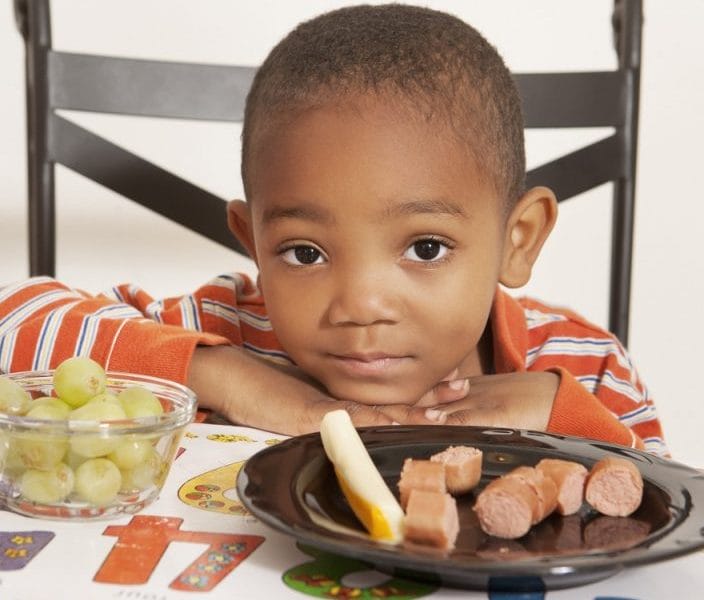 Photo: Susan Ashukian
Photo: Susan Ashukian The stress of managing food allergies is pitting couples against each other. This article from Allergic Living magazine explores how to turn down the raw emotion and learn to work together.
BY THE TIME he was 18 months old, Olivia’s* son had been diagnosed with more than 20 food and environmental allergies and was suffering with head-to-toe eczema. First Olivia created a safe environment at home, and then she became the super-allergy mom, co-founding a food allergy support group, writing allergy guidelines for the school district, and training school staff on anaphylaxis prevention and emergency measures.
“Without a doubt I put everything I had into caring for my son for eight years. This is what I had to do to keep him safe,” she says. “I knew I was not making time for my husband but felt it was most important for us to focus on safety for our son at that time.”
But eight years is a long time. When Olivia’s son was finally in school full-time and she could turn her attention back to her relationship, it was too late. Her husband had lost interest and already decided he wanted to leave the marriage. Despite more than a year of counseling, the couple began the process of divorce.
It’s no secret that food allergies or gluten sensitivity can affect the quality of a family’s life. Studies of caregivers, such as the one published in 2010 by Dr. Ruchi Gupta’s team at Northwestern University’s Feinberg School of Medicine and a study review in 2011 by a Mount Sinai School of Medicine team, reveal a profound impact on both patients and parents.
The truth is that having to control every morsel that you or your child consumes means continuous pressure around food events outside your kitchen – whether a birthday party, a brunch with friends or a holiday dinner with family.
But beyond the social anxieties, what about the stress that day-in, day-out vigilance puts upon a once-happy relationship? Allergic Living reached out to readers to ask whether food allergies or celiac disease were affecting their marriages, and causing any struggles between husband and wife. The answer, and mainly from women readers, was a blisteringly emphatic “yes”.
Like Olivia, some readers told us about divorcing as a result of strains that began with food allergies, while in other cases there is still hope and enough love to stay together. But even when the marriage bonds are holding, there are many, many couples who are hurting; raw from emotion and the rigors of avoiding allergens or gluten. Scratch the surface of these families, and what becomes evident is that communication breakdown or worse is arising with concerning frequency, especially when the couple involved is in the early years of adapting to an allergen-safe or gluten-free diet.
“Stress, marital and otherwise, doesn’t begin to describe it,” says Nadia*, whose 2-year-old daughter has multiple allergies, asthma and eczema. She and her husband have had blow-ups over Nadia’s attempts to introduce new foods in order to expand their toddler’s diet that’s currently limited to soy formula, lamb, rice, potatoes and a few fruits and vegetables. But foods like milk, eggs, chicken and banana have led to allergic reactions, so her husband will demand: “Why do we do this to ourselves and her?”
Their daughter’s asthma or itching with eczema at night means serious sleep loss, “which provides more fuel for fighting,” Nadia says. But in a moment of pride, she adds about her child: “She is totally worth it, though.”
***
AMONG the readers’ stories of their marriages, common threads begin to emerge. Often like Olivia, allergy moms are taking on so much responsibility. The mother usually speaks of being the main caregiver, assuming the role of providing a safe buffer between her allergic (or celiac) child and the rest of the world.
For instance, there’s Erin* from northern Virginia who hates grocery shopping. But she feels she can’t trust her husband Steve* to read all ingredient labels and watch out for foods their two sons must avoid. Steve has given her reason to doubt: after one of his shopping outings, their older son had a bad reaction to noodles, which turned out to carry a warning that eggs (one of his allergens) were processed on the same equipment.
While there certainly are involved and cautious allergy dads out there, reader response shows there are also many husbands who just aren’t on the same page with their wives in terms of consistent reading of package labels for allergens, making sure the child always has his or her epinephrine auto-injector and watching out for cross-contamination with foods that must be avoided.
Louise*, from Toronto, told us that her husband “just does not seem to get it and I definitely feel the burden of being the primary caregiver for my 10-year-old daughter with multiple allergies.” If she has to travel, “I do all the shopping and make all the food ahead of time because I just don’t feel I can trust him.”
Erin would understand. She notes that when their son’s reaction to noodles occurred because of her husband’s failure to check a label, she couldn’t help but see him as solely at fault. If she had done the shopping, the reaction would not have happened. But being right doesn’t necessarily help your marriage.
“When you start playing the blame game, it creates a gap in the relationship,” Erin admits. “It always finds a way to creep up in arguments.”
Being the more knowledgeable one about food allergies also doesn’t lessen your anxiety. The 2010 Northwestern University study involving 1,126 caregivers found that those who were more educated about food allergies and anaphylaxis risk were also more likely to feel stress and have a poorer quality of life than those with less awareness. What may be good for safety can weigh heavily on the mind.

Beverley Cathcart-Ross: Founder of Parenting Network, a Canadian organization
In creating a safe buffer for a child, parenting expert Beverley Cathcart-Ross says some mothers place themselves in the position of stressed-out “gatekeeper”.
Cathcart-Ross, a certified parent educator and founder of Parenting Network in Canada, says it’s common for mothers of children with special needs to do this, and these women may feel like everything depends on the family – especially the husband – following their directions on the “correct” way to manage things. She adds that if the father doesn’t fall in line, the mother tends to pull back from the relationship.
“When we’re feeling resentful, we’ll pull away the most powerful thing we have, and that is our love for them,” she says. “We marginalize them, we’re cool and distant and sleep in a different bed and we’re critical of everything they do – and things will continue this way until the hurt feelings are dealt with.”
Even if a husband is arguably in the wrong for not fully grasping the allergy rules, marginalizing him is more likely to lead to defensiveness and resentment than new-found understanding. Cathcart-Ross says the man will often feel as if he’s being treated like one of the kids instead of an equal parenting partner. When an adult is spoken to that way, he or she is more likely to react to the treatment than to absorb what’s being said.
If you’re not sure if you’re treating your spouse as an equal or as a child, examine your parenting style – if you’re using that same style on your partner, it’s time to change your approach. “If the wife wants to be in charge of the process (of allergy management) then she needs to learn to communicate effectively to get her partner onside”, says Cathcart-Ross.

Kristen Kauke works with many couples dealing with food allergy stress
There is considerable research to suggest that men and women also have vastly different approaches to problem-solving and stress, and that won’t suddenly change with food restrictions as the central issue.
“Men like to solve problems; women like to direct (the process) and they’re not always in sync,” says Kristen Kauke, a clinical social worker from St. Charles, Illinois who works with many couples dealing with food allergies. Under stress, she says women are also verbal and emotional whereas men tend to go silent. This might appear to a wife that her husband doesn’t care as much about a child’s life-threatening food allergies, when he is experiencing concern internally – but just not talking about it.
“I think knowing and respecting that we have different ways of coping is important,” Kauke says.
 Allen and Debra Diewald with their two boys.
Allen and Debra Diewald with their two boys. Allen Diewald is the father of two children, one who has outgrown a milk allergy and one who is allergic to nuts. He admits he didn’t used to carry the epinephrine auto-injector at all times for his kids. His wife Debra has long been involved in the local FAAN (now FARE) Walk for anaphylaxis in Columbia, Maryland and his relaxed attitude at one time caused “a great divide in our marriage.”
He knows he’ll hear a collective groan from allergy moms when he says, “I don’t know why I did not take the EpiPen, but sometimes I relied on my wife to do it.” He explains: “I never forgot my son had an allergy. But since I cook the majority of the meals and prepare travel food I felt I had done my part – so the EpiPen was in my wife’s hands.”
At first Allen also didn’t understand why he would take an auto-injector to places like the park, where his son would not be eating. But as he watched other kids wiping sticky hands on the playground equipment, he figured it out. He also admits that keeping family peace is, in part, why he can now be relied upon to always bring the auto-injector.
***
BUT FOR every couple who finally figures out how to keep the peace, there is another one entrenched in a cold war. And children don’t have to be involved to feel the food allergy chill. Take the case of Karli*, who lives on the west coast and is married to a highly social extrovert who loves meeting friends for dinner, whether at a restaurant or at home. Trouble is, Karli’s multiple allergies include seafood, nuts, sesame, dairy and sulfites, and that list makes eating out difficult. The result? She’s always hosting meals at their place.
“I feel the onus is on me to do all the work for these events because it is ‘my fault’ that we can’t participate in easier social occasions involving food,” says Karli. “I guess deep down I feel that he thinks I am flawed.” She thinks she has to make up for it. Karli admits with sadness: “I feel very alone in dealing with the issues around my allergies.”
In fact, in this she is not at all on her own. Another theme that emerged clearly in the stories readers sent to Allergic Living was a sense of isolation when a couple wasn’t in unison on food management.
Remember Erin in Virginia who doesn’t trust her husband’s shopping? Besides handling her son’s allergies, she has her own severe milk allergy. She finds date nights difficult because her husband gets frustrated about having to check restaurant menus in advance and having to work around “her stupid allergy” as he’s inclined to call it.
Karli also doesn’t know if she can count on her husband to be in her corner when it comes to allergies. “I wonder what would happen if I had a serious reaction. I’m not even sure he knows the symptoms or would use an EpiPen on me, not wanting a fuss.” Kauke suggests the divide might not be as great for Karli and her husband as it appears.
“We are stuck in these patterns and we start seeing the other person as the enemy, when instead we should be looking at stress as the enemy. Healthy relationships have certain components in them like shared power – not control – and autonomy, respect, forgiveness and realistic expectations. If we want our relationship to be healthy, we have to work hard to manage our anxiety and not use it to inform our behavior.”
She says Karli’s husband may not realize that “his actions are having this effect on her, or perhaps underneath, it is fear for her. She needs to trust that he’s here for her, and I think that’s a fear for all of us.”
“If he can understand that, it can be motivating; we all want to be connected to our spouse,” Kauke says. She adds that anyone dealing with a similar situation should be able to tell their partner how this behavior makes them feel and, without passing on blame, ask why they act the way they do.
Some of the stories we received from readers – men and women – about spouses not believing the severity of their allergies were disturbing. There’s the husband who insists that kissing his allergic wife after eating peanut butter wouldn’t hurt her. A wife who continues to wear perfume even though it forces her husband to sleep in a separate room because she doesn’t believe he has a severe sensitivity to fragrance. Another husband thinks his wife takes her celiac diagnosis “too seriously” and she is forever re-washing her separate utensils and cutting boards that he has contaminated with gluten.
Kauke says about these cases, “I caution anyone not to mistake a conflict about celiac, food or other allergies with a more fundamental relationship issue. Think about when respect, honesty, trust, shared power and commitment occur in your relationship and when they do not. Sometimes our current struggle highlights a deeper, underlying issue and discontent is an invitation to evaluate the patterns of our own behavior and how they help or hinder the quality of our life.”
Next: Emotionally-focused therapy





